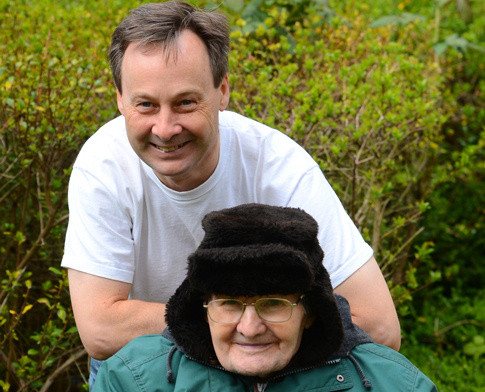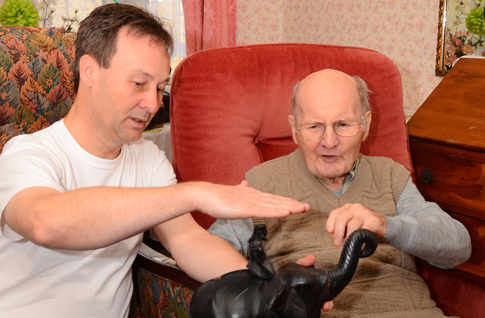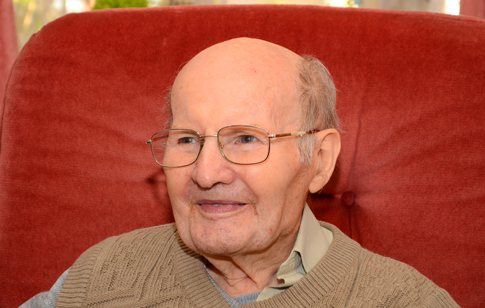A man whose father has dementia is taking part in a research project funded by Alzheimer’s Society
From the June/July 2016 issue of our magazine, Luke Bishop talks to a man whose father has dementia and who decided to participate in Alzheimer's Society-funded research that is finding out about the very earliest stages of dementia.

Malcolm Weller, from Ealing in west London, was keen to participate in the Society-funded PREVENT research project when he found out about it in 2012.
Malcolm, now 54, was at that point looking after his father Barrie, who had come to stay to recuperate from an operation. It soon became clear that his father had difficulties with his memory, balance and spatial awareness.
Barrie was diagnosed with vascular dementia, later amended to mixed dementia with Alzheimer's disease. At the memory clinic Malcolm was offered the chance to participate in the PREVENT study.
He explains,
'The doctor at the clinic, Dr Brian Corridan, was one of the people who was helping to set up the PREVENT project and asked us if we wanted to be involved in any studies. My dad wasn't interested but I said yes.
'The project is all about trying to find some of the markers that give an indication of potential risk of acquiring dementia in the future.'
Unusually for dementia research, PREVENT is studying people in their 40s and 50s to understand what changes take place in the body at the very earliest stages of the condition. The aim is to identify factors that increase someone's risk and then to reduce this risk.
Like an MOT
The PREVENT study began at Imperial College London – where Malcolm takes part – before expanding to sites in Edinburgh, Oxford and Cambridge.
Malcolm says,
'I have now been through two assessments, one of which was earlier this year and the first two years before that.
'They take blood samples and test them for various things, they do cognitive tests, they test lung function and strength, your height and weight, take samples of your saliva and urine and also do an MRI scan to see what the brain looks like.
'It is kind of the equivalent of having an MOT carried out.'
This has also led to Malcolm becoming involved in other research projects, such as the Approaches to the Communication of Alzheimer's Disease Risk (ACAR) project led by the University of Cambridge.
This study, in which Malcolm was involved in January 2016, covered interesting ethical and personal dilemmas, such as how much information can and should be given to people regarding the likelihood of developing dementia.

Health and lifestyle
Malcolm has asked researchers for the results of some of the tests he has undergone in order to better understand his personal health, if not necessarily his risk of developing dementia.
He says that participation in research has also encouraged him to think more about his lifestyle, particularly diet, activity and exercise.
'Based on the evidence of previous studies there is a theory that certain lifestyles can decrease your risk. For example, eating oily fish may improve your brain function and decrease the risk of developing Alzheimer's disease.
'Part of the study also goes into those lifestyle areas, so they ask you about the types of food that you eat on a regular basis. They take notes on your diet, hours of exercise per week and so on.
'I think that, when you know that certain types of behaviour increase risk of dementia, it does encourage you to get up and go for that run, for example. It has certainly changed my perception in that respect.'
Involvement
Since joining the PREVENT study, Malcolm has become involved in its participants' panel, which provides feedback about how the project is run. The panel was consulted on a membership scheme to encourage fundraising for the project, as well as ongoing engagement with participants and the public. This scheme was launched earlier this year.
Crucially, Malcolm believes that participation in the research has allowed him a greater appreciation of what his father, who is now living in a care home, is going through with his dementia.
He says,
'Through taking part in the study I have learned a lot about dementia. For example, my wife got me a book to read about how to react with a person who has dementia so as not to exacerbate the problems that they are going through.
'There was a time when he was living with me when I would be working in one room and my dad would come in and ask questions. I would give him the answer and he would go away and then come back again and ask the same question.
'I've realised that, at such times, it is important not to get too upset and to answer the question in the same way, because if you get irritated then that can create quite a big problem as he wouldn't then understand why someone is getting annoyed with him.'

Improved relationship
Malcolm says that his relationship with his father has improved as his understanding developed and their circumstances changed.
'All the time he was staying around my house, our interactions were limited to catering for his needs. He would repeat questions quite regularly and so our relationship was getting a bit strained.
'Now when I visit him in the care home I spend a few hours with him there, and it is nice and enjoyable to interact with him. We go through old photograph albums and poetry books.'
By taking part in the PREVENT study, Malcolm and his fellow participants are helping to make sure that we will one day not only understand a person's risk of developing dementia, but also what they can do about it.







